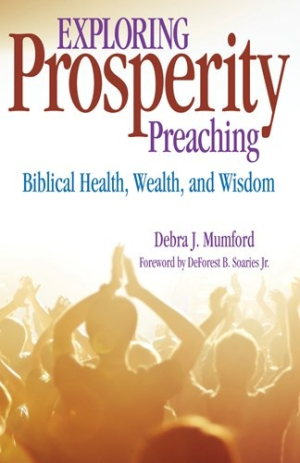Exploring Prosperity Preaching
Biblical Health, Wealth, & Wisdom
Faithful Christians have certain rights, such as the right to pristine health and to accrue wealth. If you are a Christian who does not enjoy these privileges, well, look no farther than the mirror: your commitment to God is lacking. At least that is what Debra J. Mumford, an Assistant Professor at Louisville Presbyterian Theological Seminary, says “prosperity gospel” or “Word of Faith” preachers will have parishioners believe. Mumford argues this belief is among many ungodly “Word of Faith” preaching tactics, and she sets out to illuminate and evaluate them all for undiscerning believers: “Any preacher who makes unfounded promises and then blames followers for the failure of those promises to materialize is engaging in ungodly preaching.”
The book’s appeal is its persistent effort to demonstrate how prosperity ministers may purposely or unwittingly misinterpret the Bible to support prosperity teaching. To illustrate this, Mumford provides a section in each chapter, “Sifting the Wheat from the Chaff,” that debunks prosperity teaching claims. For example, prosperity preachers often argue that Christians should live by faith and purchase items such as homes and cars they cannot afford. Mumford maintains this is irresponsible. Another example the author uses to suggest prosperity preachers often co-opt scriptures in the Bible to support their own claims involves Creflo Dollar, who argued that the donkey Jesus’s parents owned was comparable to a Cadillac. Mumford quips it was more like a Ford Fiesta, and argues that Jesus is most often depicted in the Bible as humble, not prosperous.
Though prosperity ministry is influenced by the work of E. W. Kenyon, Kenneth E. Hagin, and others, and is seemingly as popular among whites as it is among blacks, Mumford focuses heavily on Creflo Dollar and other black prophetic preachers. This is an interesting focus, particularly when Mumford challenges prosperity preachers’ colorblind stance—their denial that racism exists and oppresses people, including Christians.
Part of Mumford’s preparation for writing the book included attending services at Dollar’s church. The limited scope of Mumford’s stated preparation—though the book stems from dissertation work—and the lack of a firm methodology and theoretical base makes for questionable scholarship, yet Mumford’s point is advisable. The prosperity message is an attractive one, especially to disenfranchised, poor, or struggling people in need of hope. However, Mumford never suggests that prosperity is not attainable; instead, she urges readers to problematize the notion of prosperity and to become shrewd consumers of the Bible and sermons.
Reviewed by
Kaavonia Hinton
Disclosure: This article is not an endorsement, but a review. The publisher of this book provided free copies of the book and paid a small fee to have their book reviewed by a professional reviewer. Foreword Reviews and Clarion Reviews make no guarantee that the publisher will receive a positive review. Foreword Magazine, Inc. is disclosing this in accordance with the Federal Trade Commission’s 16 CFR, Part 255.

